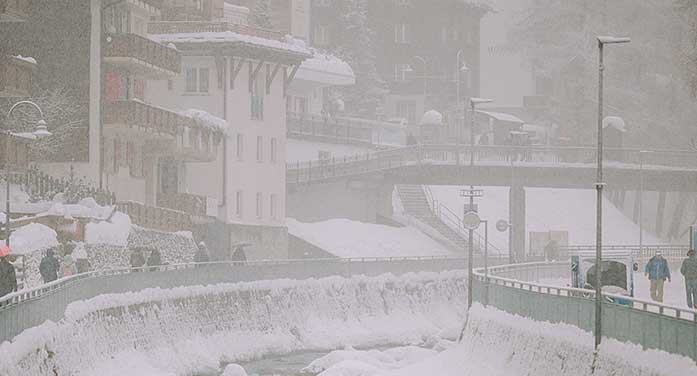 The possibility of Russia invading Ukraine is the hottest geopolitical issue today. And this carries implications for the global energy balance.
The possibility of Russia invading Ukraine is the hottest geopolitical issue today. And this carries implications for the global energy balance.
Growing concerns over the possible military conflict in Ukraine, resulting in disruption of natural gas supplies to Europe, is a point of deliberation in Washington and other NATO capitals.
The United States has made it clear that Russia will have to pay a steep price for any Ukraine misadventure. But the task isn’t that simple. A lot of calculations will have to be made before the U.S. and its partners can respond to any Russian incursion into Ukraine.
NATO allies are dependent on Russian gas supplies. So it may not be easy for them to be a part of any U.S. move against Russia.
Russia supplies the European Union with about a third of its crude oil and gas. Gas is mainly pumped via pipelines that transit Ukraine or other eastern European nations to heat homes and power industry across the 27-nation bloc and its neighbours, such as Britain. Last year, according to industry estimates, Russia provided about 128 billion cubic metres of gas to Europe, and about a third of that flowed through Ukrainian territory.
 For a host of reasons, German dependence on Russian gas is even higher. The Wall Street Journal reports that Germany’s dependence on Russian gas has left Europe short of options to sanction Russia if it invades Ukraine.
For a host of reasons, German dependence on Russian gas is even higher. The Wall Street Journal reports that Germany’s dependence on Russian gas has left Europe short of options to sanction Russia if it invades Ukraine.
A two-decade-old decision to phase out nuclear power and more recent moves to cut reliance on coal to bring down CO2 emissions mean Germany is more reliant on Russian gas than most of its neighbours. That gas is used for heating and power generation.
Germany is the world’s biggest buyer of Russian gas. It draws more than half of its gas imports from Russia against an average of 40 per cent for the rest of the European Union, according to the EU’s statistics agency Eurostat.
To reassure its European partners, the United States has been working overtime to help meet their winter demand and ensure regular gas supplies from other sources. On Tuesday, the White House announced that President Joe Biden will host the emir of Qatar this week. The two leaders are expected to discuss ways to respond to the possibility of Russia cutting off natural gas to Western Europe.
But there are other factors at play. Germany, for example, doesn’t have a single liquefied natural gas (LNG) import terminal. And establishing an LNG terminal will take time. Germany’s dependence on Russian gas, supplied through pipelines, is even greater than most of its European partners. So for it to be part of any concerted move against Russia would have immediate consequences.
The American administration, meanwhile, has vowed that it’s working to ensure that Europeans don’t freeze if Russia cuts off its energy exports in retaliation for the economic sanctions being threatened by the U.S. and its allies if Russia invades Ukraine.
Senior U.S. administration officials say they’ve been working to identify natural gas sources around the world – “from North Africa and the Middle East to Asia and the United States,” as one put it – for European markets.
Canada missing out on $1.2-trillion EU natural gas market by Mark Milke and Lennie Kaplan
The U.S. is also discussing with major global gas producers whether they can deliver extra energy to Europe through the remainder of the winter and into spring, media reports said.
Diverting LNG cargoes destined for Asia to Europe has been discussed. But with the prevailing tight markets, Asia’s leading LNG importers – China, Pakistan, Bangladesh and India – would bear the consequences of any diversion. They can ill afford that, and the Americans need to be aware.
There are also reports that Saudi Arabia, Kuwait and Iraq would struggle to cover any shortfall in crude oil supplies created by a blanket ban on Russian energy exports. Those nations have already allocated their annual supplies.
In the meantime, some of the largest U.S. companies have called on the Biden administration and Congress to tread carefully with potential new sanctions against Russia, Charles Kennedy said in his piece in oilprice.com. Sanctions could damage American firms, the report asserted.
And there’s a flip side to the story: Europe could find long-term replacements for Russian supplies to the benefit of alternative suppliers.
But for the time being, though, sorting out this mess rests heavily on the U.S. administration.
Toronto-based Rashid Husain Syed is a respected energy and political analyst. The Middle East is his area of focus. As well as writing for major local and global newspapers, Rashid is also a regular speaker at major international conferences. He has provided his perspective on global energy issues to the Department of Energy in Washington and the International Energy Agency in Paris. For interview requests, click here.
The opinions expressed by our columnists and contributors are theirs alone and do not inherently or expressly reflect the views of our publication.
© Troy Media
Troy Media is an editorial content provider to media outlets and its own hosted community news outlets across Canada. Canada.

